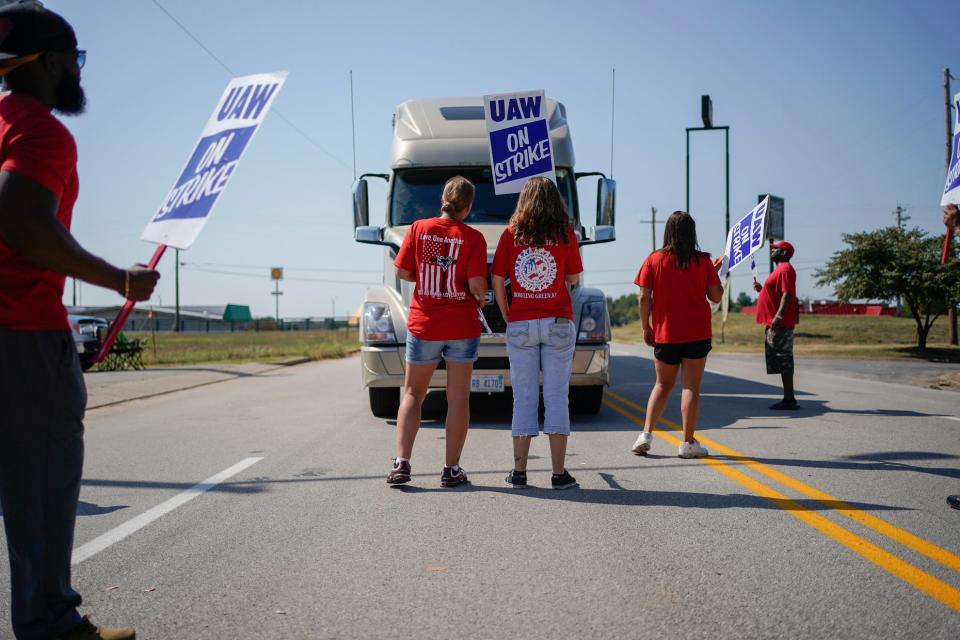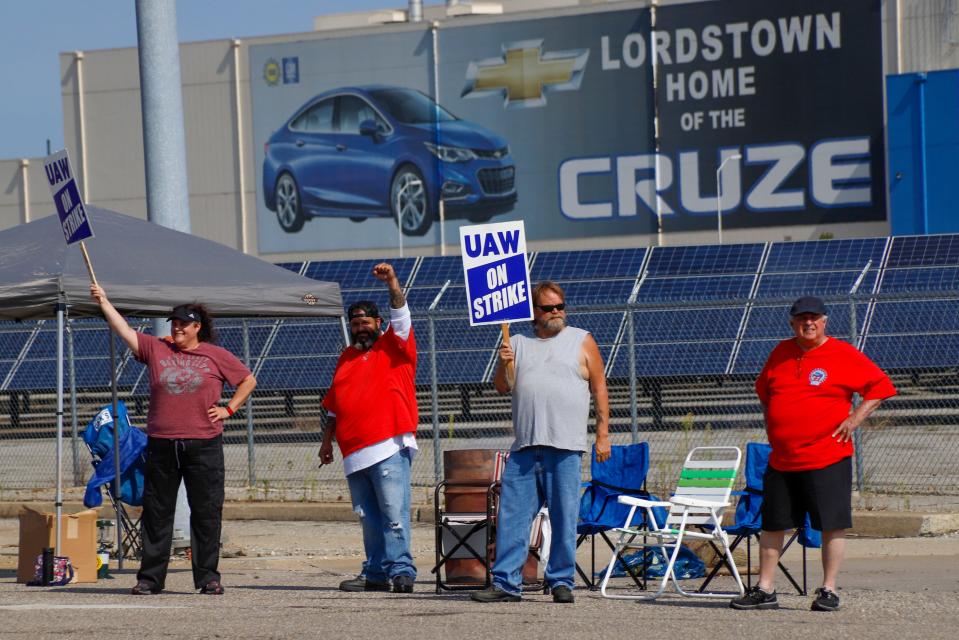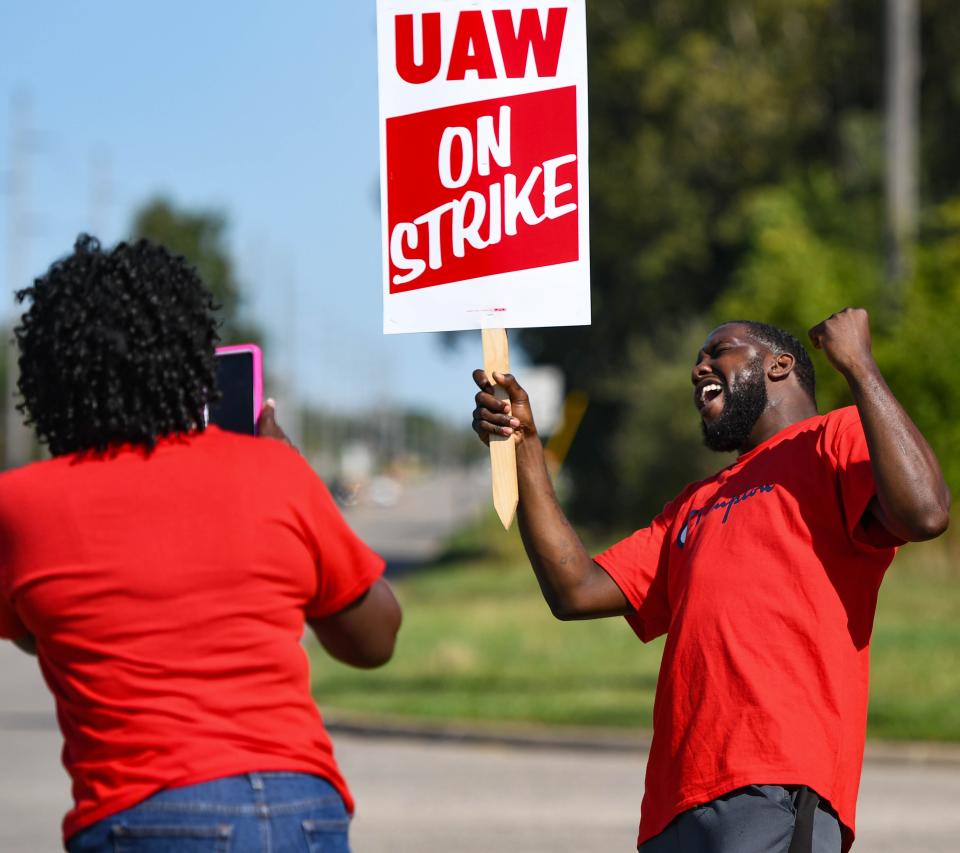'Truly saved my life': GM workers on strike fight for benefits as automaker's profits soar

For Brad Heitz, the General Motors strike couldn't be more personal.
He credits the health insurance plans the United Auto Workers won from the automaker with saving his life – and worries those kinds of benefits could start disappearing if the strike isn't successful.
"If it weren't for the UAW, I don't think I would be alive right now," said Heitz, who works at the GM plant producing Chevrolet Colorado and GMC Canyon pickups and Chevy Express and GMC Savana vans in Wentzville, Missouri.
Heitz is one of the 46,000 members of the United Auto, Aerospace and Agricultural Implement Workers out on strike after GM and the union were unable to reach a contract agreement.
For individual workers, walking the picket line has a cost: Workers earn only $250 per week in union strike benefits, and it doesn't start until after the 15th day of the strike.
Plus, no health care: GM dumped health care for striking workers. That poured gas on fire, expert says
Workers say the fight for a better contract is worth the risks to their pay.

For temps, little job security
For Heitz, the main reason to strike is to preserve health care benefits. GM spends $1 billion a year on worker health care, which some auto industry observers consider unsustainable.
For others, it's GM's use of temporary workers instead of hiring full-time workers with higher pay and better benefits. Or the company's move to trade American jobs for production in Mexico. Workers say they are proud of the vehicles they build for GM and the Detroit-based automaker, which has been producing strong profits, shouldn't continue to whittle away at worker benefits.
"We feel like we have given back and given back," said Glenn Kage, president of UAW Local 2250 in Wentzville. "We don't want to hurt GM. We also know they've been making record profits."
What about car shoppers? How UAW's GM strike will affect availability of vehicles
At the GM plant in Spring Hill, Tennessee, the issue of temporary workers is a special concern for some. GM is said to want to increase the number of temporary workers on its assembly lines, while the union wants the automaker to hire temp workers full time.
Over the past 14 months, Andrew Barber, 26, said he has gotten one, unpaid vacation day as a temporary worker on the plant’s assembly line. Another woman who works across from him has been there for three years, he said – and still hasn’t been hired on as a permanent employee, with better job security and benefits.
Temporary workers perform the same tasks as the permanent workers beside them. But they receive a maximum of three unpaid vacation days per year – and that’s only if they’re approved by their supervisors.
Barber was the only temporary worker out of about two dozen at one of a handful of picketing locations on Wednesday. As whispers of a possible strike circulated around the plant for months, Barber tried to save up his money for when the time came.
“As a temp, you can’t really do anything to fight back. You have to rely on the permanent workers to help you,” he said. “With GM, it’s never a matter of 'if' you’re gonna get laid off. It’s 'when,' " Barber said.

Mandatory overtime is a normal occurrence, and on two occasions, Barber was laid off by the plant for a week at a time, during which he wasn’t paid and his health insurance was canceled. His insurance doesn’t cover vision or dental.
“Out of this, I expect permanent employment and full benefits,” Barber said. “That’s the only thing I really care about.”
Out of roughly 3,600 employees at the Tennessee plant, around 200 are temporary, said UAW Local 1853 Bargaining Chairman Mike Herron. Another 100 or so temporary workers were laid off in the last six weeks, he said.
“Some of these people that got laid off had been with us for three years. People who busted their butt every day to do a great job of building cars here, and there was no pathway for them to become permanent,” Herron said. "None."
A fight for the middle class
Some workers see the issues more broadly, knowing their strike could play a role for what other middle-class workers receive. Karlton Byas, walking the picket line outside the main entrance to GM's Detroit-Hamtramck Assembly Plant, frames the issue in terms of fighting for average workers. His perspective is honed from 35 years at GM, including weathering three strikes.
“We’re the baseline for the middle class,” he said, asserting that workers in other professions, from teachers to firefighters, can see their wages affected by what automakers are able to negotiate in their contracts.
How long will the strike last? As strike continues, GM and UAW resume talks
Besides, he said, a decent contract is only a matter of fairness. “We’ve sacrificed for this corporation during bankruptcy," he said, referring to the automaker's 2009 reorganization in the depths of the recession. "They’re doing well."
For some, the strike becomes a matter of personal sacrifice.
“I was preparing myself for this,” said Jacquline Brent, on the picket line at GM's Lansing Delta Assembly plant in Michigan. “But there’s only so much you can do. It’s not like we make a whole lot of money that you can save and work and live. But I am prepared for this.”
How? Brent, a 31-year GM veteran, said she has cut back on a lot of things. “You just don’t know what the future holds.”

Darius Burton, who has worked at the plant for five years, said he, too, could see a strike coming and tried to prepare.
That includes cutting out what he called “extracurricular activities. No drinking, no smoking.”
Then there's Heitz, who said UAW-negotiated health care benefits were the reason he could afford multiple surgeries over the years. He said he recovered from a motorcycle accident, but his job at the Wentzville plant also has been tough on his body. He walks as many as 27,000 steps a day and constantly is carrying boxes and supplies. that "This isn't an office with a carpet," he said.
At one point, he said, he had a prescription for 30 pills that would have cost $523 out of pocket. Because of UAW-negotiated medical benefits, he said the cost to him was $11.88.
To Heitz, 30, and father to a 7-month-old daughter, those costs are real. But he said he thinks to GM, they are impersonal — and that's why he's invested in picketing. He hopes to win concessions for the UAW.
The benefits he's fighting for, he said, "truly saved my life."
Contributing: Eric D. Lawrence and Jamie L. LaReau, Detroit Free Press
This article originally appeared on USA TODAY: GM strike: UAW fights for health care, benefits in contract talks

